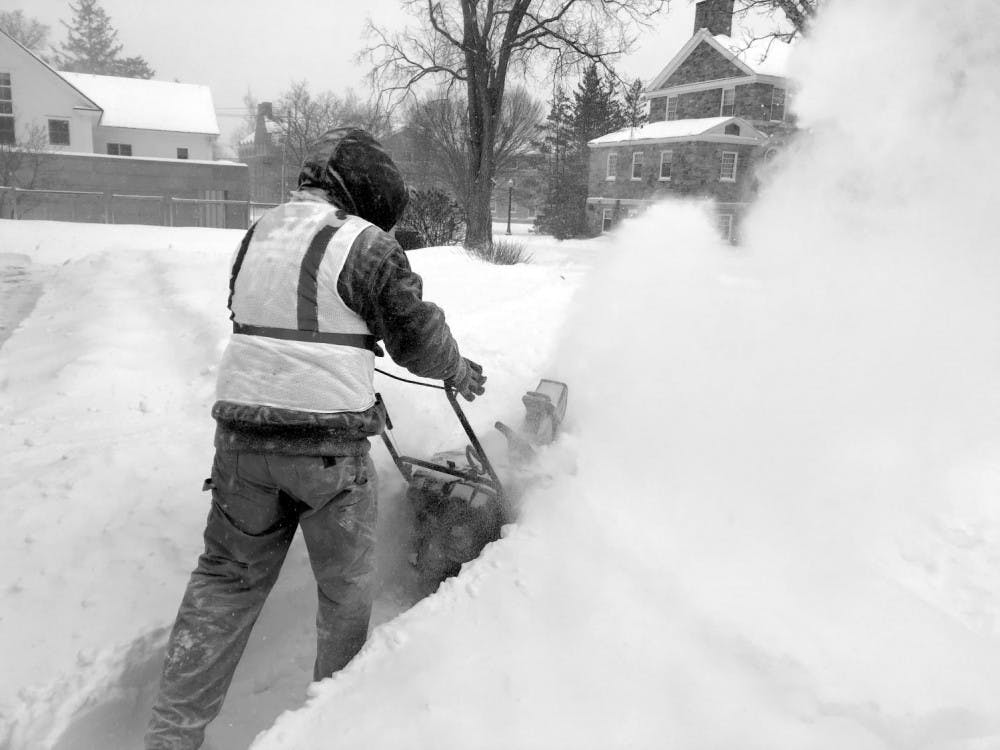For full staff issue coverage, click here.
Middlebury College had its first-ever Martin Luther King Jr. Day off this week, and many were left wondering what the commemoration meant — and, perhaps more importantly, why it was happening only for the first time.
At the very least, the holiday demonstrated the administration’s often-unrealized but well-intentioned desire to make all Middlebury students feel equally recognized and validated here. It is right to set aside a day to honor Dr. King’s advocacy for justice, nonviolence and peace, but committing ourselves to Dr. King’s legacy means that we must confront the injustices he fought and remember those he struggled for, including oppressed racial minorities and workers. To truly honor Martin Luther King Jr., we should follow his example by refusing to neglect those in our own community who feel overlooked and invisible.
After our recent snowstorm, as we walk neatly shoveled paths across campus, it is difficult not to notice the staff members who work tirelessly to make Middlebury liveable. Last Winter Term, we published an article on the snow removal staff. Clinton “Buzz” Snyder, the college’s landscape supervisor, and Luther Tenny, facilities maintenance and operations director, work together to oversee snow removal operations. For a “typical snow event” (a foot or less of snow), 14 snow plows and ten crews of shovelers assemble to tackle the campus. Workers are called in the order of their proximity to the school; staff who live in New York are called in earlier than those who live in Vermont. Plow crews come in around 4 a.m. to clear the roads and walkways. These crews clean over 120 college buildings, including off-campus housing such as Weybridge, Homestead and the Mill.
This spring, the Middlebury College staff and faculty will experience significant changes. In an effort to maintain Middlebury’s financial sustainability, the administration announced a workforce planning process last year that will identify areas where the college can be more efficient in its spending, in part through faculty and staff cuts. In the end, the college hopes to cut about 10 percent of staff compensation costs through buyouts, and save over $2 million over the next few years through early retirement by faculty.
It is unfortunate that the people who work the hardest for this school should have to worry about the security of their jobs. Recent dining hall short-staffing during this week’s snowstorm pointed to the value of each individual staff member. It’s difficult to meet our low-waste environmental standards when we have to use paper plates and cups instead of reusable ones. We rely on staff for all our school’s operations, from putting on plays to coordinating on behalf of student organizations. Our school does not run without them.
As a student newspaper, we have not always done a good enough job covering the issues that matter to the staff members who make Middlebury a place we can call home. We understand that part of the reason why this relationship has been tenuous in the past is because staff members are often not allowed to speak freely without repercussions. Our renewed commitment to community integration may take the form of more anonymous interviews. As we have seen in the process of putting this issue together, there are more nuanced considerations for staff who wish to voice opinions or concerns than there are for students or faculty.
We believe that The Campus should be the medium through which staff members can express their opinions openly.
At the same time, as Middlebury’s primary newspaper, we hope to provide an outlet for every person in our community. We hope to extend the lines of communication and give voice to faculty and staff concerns, which should be concerns for every person who has a stake in this school — that is, for all of us. If it weren’t for staff, Middlebury would be unsuccessful, not to mention uninhabitable. Let’s appreciate the people without whom this college would cease to exist.
This J-Term: Remember Staff

Comments

![Copy of Editorial [Susanna] (3) (1) (2) (1).JPG](https://snworksceo.imgix.net/mbc/11c1e285-1b2c-4ee9-9d20-4a2f24335290.sized-1000x1000.JPG?w=1500&ar=16%3A9&fit=crop&crop=faces&facepad=3&auto=format)

